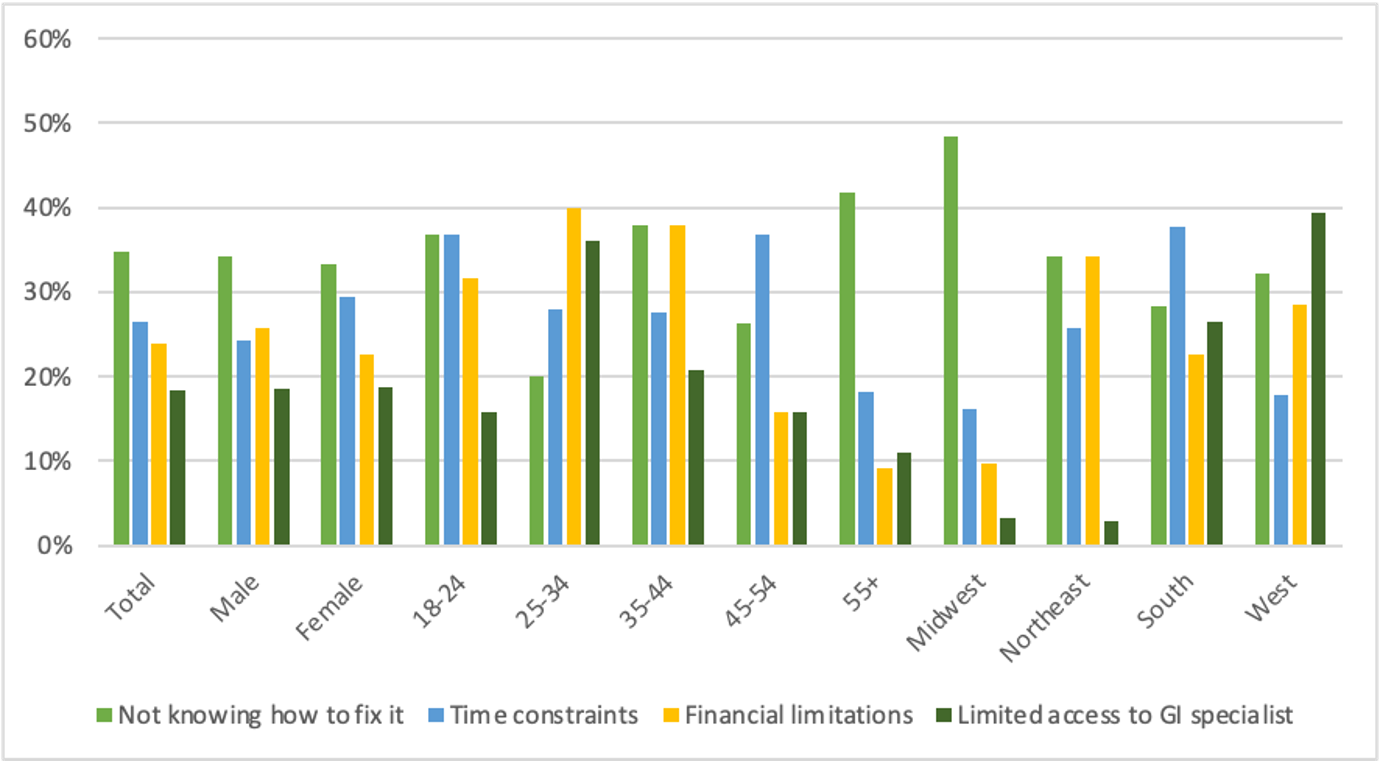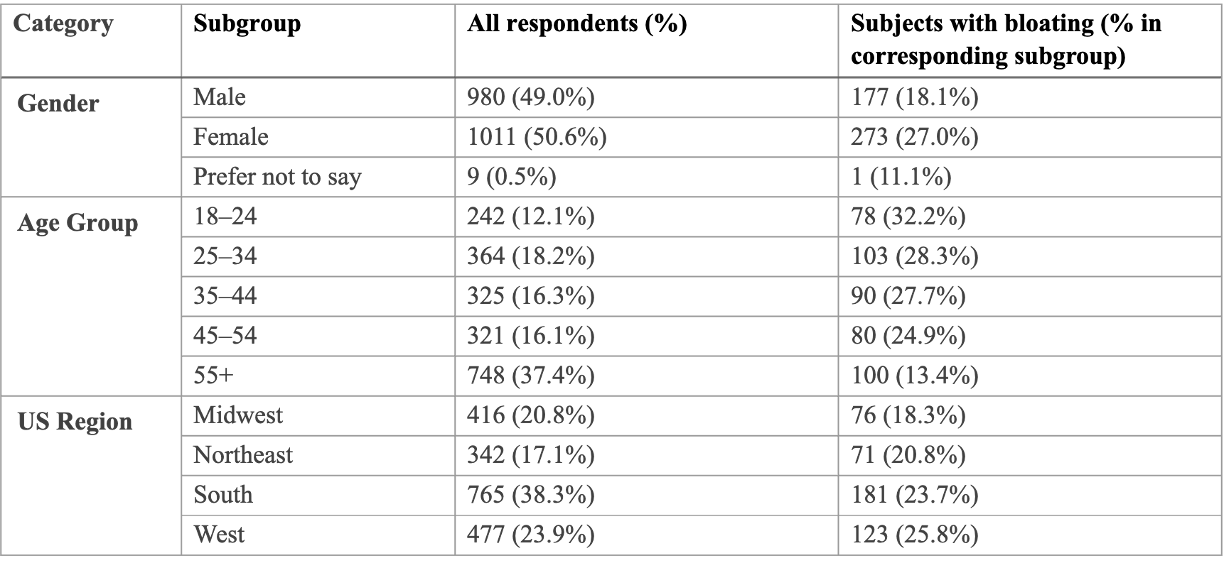Monday Poster Session
Category: Functional Bowel Disease
P2920 - Prevalence and Perception of Post-Prandial Bloating in the U.S. Adult Population: Results From a Nationally Representative Survey
Monday, October 27, 2025
10:30 AM - 4:00 PM PDT
Location: Exhibit Hall
- SK
Shaghayegh Khanmohammadi, MD (she/her/hers)
Tehran University of Medical Sciences
Tehran, Tehran, Iran
Presenting Author(s)
Shaghayegh Khanmohammadi, MD1, Sepideh Mehravar, MD2, Krystyna Houser, 3, Mark Pimentel, MD, FACG4, Ruchi Mathur, MD2, Ali Rezaie, MD, MSc4
1Tehran University of Medical Sciences, Tehran, Tehran, Iran; 2Cedars-Sinai Medical Center, West Hollywood, CA; 3mBIOTA Elemental, Santa Monica, CA; 4Cedars-Sinai Medical Center, Los Angeles, CA
Introduction: Bloating is among the most common gastrointestinal symptoms, yet its burden and perception in the general population remain underexplored. Using a nationally representative U.S. sample, we aimed to characterize the beliefs and behaviors surrounding post-prandial bloating and identify demographic patterns that may influence care-seeking behavior.
Methods: An online anonymous survey of nationally representative US adults aged ≥18 was conducted in March 2025. Respondents answered questions regarding their experience and beliefs about bloating, as well as actions taken or reasons for inaction among those who viewed bloating as a potential health issue. Chi-square tests were used to examine associations between age, gender, and reported perceptions or actions.
Results: Among 2,000 respondents, 22.6% reported experiencing bloating within two hours of eating, with a higher prevalence among females compared to males (27.0% vs 18.1%; odds ratio 1.7, 95% confidence interval: 1.4-2.1). Patients older than 55 reported less bloating as compared to subjects 18-55 years (13.4% vs 28.0%, p< 0.01). Modest but significant differences were seen within four US regions. (Table 1)
The majority of respondents with bloating (51.1%) believed that occasional bloating, gas, or stomach discomfort is normal, 29.7% considered it a sign of a deeper issue, and 19.2% were unsure. Similar proportions of males and females perceived bloating as normal (51.8% vs 50.6%, p=0.6), with no significant regional differences. However, patients older than 55 were significantly less likely to consider bloating normal compared to younger groups (45.3% vs 54.6%, p< 0.01).
Among those who believed such symptoms may indicate a deeper issue (n=594) (75.3% reported they have addressed or would address the symptoms, with comparable rates among males and females (73.8% vs.76.9%, p=0.5).Among those who would not address bloating, the primary barrier was uncertainty about appropriate treatment options (34.7%), followed by time constraints (26.5%). Financial limitations were cited by 23.8%, and 18.4% reported difficulty accessing gastrointestinal specialists. The results were comparable among males and females. (Figure 1)
Discussion: Despite affecting >20% of the US adults, bloating is normalized or ignored in more than half of those affected. More than a quarter of individuals who recognize the potential seriousness of bloating still avoid seeking care. Findings highlight the need for public education and improved symptom recognition.

Figure: Table 1. Baseline demographics of all respondents (n=2,000) and subjects experiencing postprandial bloating (n=451).

Figure: Figure 1. Barriers in patients who believed bloating may indicate a deeper issue but would not seek medical help (n=147). Significant variations in barriers are detected based on age groups and regions.
Disclosures:
Shaghayegh Khanmohammadi indicated no relevant financial relationships.
Sepideh Mehravar indicated no relevant financial relationships.
Krystyna Houser: mBIOTA Elemental – Stock-privately held company.
Mark Pimentel: Ardelyx – Consultant. Gemelli Biotech – Advisory Committee/Board Member, Royalties, Stock-privately held company. GoodLFE – Stock-privately held company. Salvo Health, Cylinder Health – Stock Options.
Ruchi Mathur: Gemelli Biotech – Royalties, Stock-privately held company. goodLFE – Stock-privately held company.
Ali Rezaie: Ardelyx, Blueprint Medicine and Salix Pharmaceuticals – Consultant. Gemelli Biotech, and Good LFE – Equity stake.
Shaghayegh Khanmohammadi, MD1, Sepideh Mehravar, MD2, Krystyna Houser, 3, Mark Pimentel, MD, FACG4, Ruchi Mathur, MD2, Ali Rezaie, MD, MSc4. P2920 - Prevalence and Perception of Post-Prandial Bloating in the U.S. Adult Population: Results From a Nationally Representative Survey, ACG 2025 Annual Scientific Meeting Abstracts. Phoenix, AZ: American College of Gastroenterology.
1Tehran University of Medical Sciences, Tehran, Tehran, Iran; 2Cedars-Sinai Medical Center, West Hollywood, CA; 3mBIOTA Elemental, Santa Monica, CA; 4Cedars-Sinai Medical Center, Los Angeles, CA
Introduction: Bloating is among the most common gastrointestinal symptoms, yet its burden and perception in the general population remain underexplored. Using a nationally representative U.S. sample, we aimed to characterize the beliefs and behaviors surrounding post-prandial bloating and identify demographic patterns that may influence care-seeking behavior.
Methods: An online anonymous survey of nationally representative US adults aged ≥18 was conducted in March 2025. Respondents answered questions regarding their experience and beliefs about bloating, as well as actions taken or reasons for inaction among those who viewed bloating as a potential health issue. Chi-square tests were used to examine associations between age, gender, and reported perceptions or actions.
Results: Among 2,000 respondents, 22.6% reported experiencing bloating within two hours of eating, with a higher prevalence among females compared to males (27.0% vs 18.1%; odds ratio 1.7, 95% confidence interval: 1.4-2.1). Patients older than 55 reported less bloating as compared to subjects 18-55 years (13.4% vs 28.0%, p< 0.01). Modest but significant differences were seen within four US regions. (Table 1)
The majority of respondents with bloating (51.1%) believed that occasional bloating, gas, or stomach discomfort is normal, 29.7% considered it a sign of a deeper issue, and 19.2% were unsure. Similar proportions of males and females perceived bloating as normal (51.8% vs 50.6%, p=0.6), with no significant regional differences. However, patients older than 55 were significantly less likely to consider bloating normal compared to younger groups (45.3% vs 54.6%, p< 0.01).
Among those who believed such symptoms may indicate a deeper issue (n=594) (75.3% reported they have addressed or would address the symptoms, with comparable rates among males and females (73.8% vs.76.9%, p=0.5).Among those who would not address bloating, the primary barrier was uncertainty about appropriate treatment options (34.7%), followed by time constraints (26.5%). Financial limitations were cited by 23.8%, and 18.4% reported difficulty accessing gastrointestinal specialists. The results were comparable among males and females. (Figure 1)
Discussion: Despite affecting >20% of the US adults, bloating is normalized or ignored in more than half of those affected. More than a quarter of individuals who recognize the potential seriousness of bloating still avoid seeking care. Findings highlight the need for public education and improved symptom recognition.

Figure: Table 1. Baseline demographics of all respondents (n=2,000) and subjects experiencing postprandial bloating (n=451).

Figure: Figure 1. Barriers in patients who believed bloating may indicate a deeper issue but would not seek medical help (n=147). Significant variations in barriers are detected based on age groups and regions.
Disclosures:
Shaghayegh Khanmohammadi indicated no relevant financial relationships.
Sepideh Mehravar indicated no relevant financial relationships.
Krystyna Houser: mBIOTA Elemental – Stock-privately held company.
Mark Pimentel: Ardelyx – Consultant. Gemelli Biotech – Advisory Committee/Board Member, Royalties, Stock-privately held company. GoodLFE – Stock-privately held company. Salvo Health, Cylinder Health – Stock Options.
Ruchi Mathur: Gemelli Biotech – Royalties, Stock-privately held company. goodLFE – Stock-privately held company.
Ali Rezaie: Ardelyx, Blueprint Medicine and Salix Pharmaceuticals – Consultant. Gemelli Biotech, and Good LFE – Equity stake.
Shaghayegh Khanmohammadi, MD1, Sepideh Mehravar, MD2, Krystyna Houser, 3, Mark Pimentel, MD, FACG4, Ruchi Mathur, MD2, Ali Rezaie, MD, MSc4. P2920 - Prevalence and Perception of Post-Prandial Bloating in the U.S. Adult Population: Results From a Nationally Representative Survey, ACG 2025 Annual Scientific Meeting Abstracts. Phoenix, AZ: American College of Gastroenterology.
